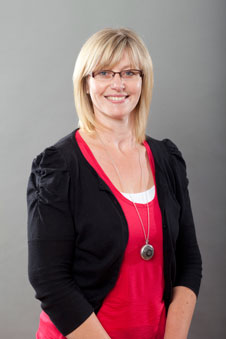
A study that will focus on older drivers is one of Otago's 18 new funding contracts from the HRC.
A study that will investigate older drivers in New Zealand, and the complex balance between maintaining mobility and maximising safety, is one 18 Health Research Council of New Zealand funding contracts granted to Otago.
The HRC announced its latest funding round this morning. The Otago contracts include three major multi-million, five-year programmes and 15 projects.

Dr Rebecca Brookland.
The older driver study, led by Dr Rebecca Brookland of Preventive and Social Medicine, will receive $1,193,921 over 36 months. It has been developed in consultation with the Ministry of Social Development, Ministry of Transport, NZ Transport Agency, Age Concern and Turanga Health.
Most older New Zealanders travel by private car and continuing to drive is key to maintaining mobility, independence and quality of life. Giving up driving can have serious negative consequences for older people's health and wellbeing.
“Facing the reality that driving is no longer an option is a significant event for the individual and their families,” Dr Brookland explains. “Some drivers may reach the decision to reduce or cease driving on their own, but these decisions are often not made in isolation and can result in abrupt changes to mobility and consequently people's quality of life.”
The team will interview 1200 older drivers to investigate their travel patterns, driving behaviour, and driving-related attitudes and perceptions, and identify how strategies, such as self-regulation of driving, may help maintain their driving independence as long as is safely possible.
"Facing the reality that driving is no longer an option is a significant event for the individual and their families."
The adult children of older drivers will also be interviewed as part of the study, about their views and experiences in dealing with ageing parent drivers. General Practitioners will also be interviewed.
“GPs are key to making decisions about fitness-to-drive and are a pivotal resource for understanding the mobility and safety issues at stake for older drivers.”
Dr Brookland hopes the findings of the study will be used to assist the development of evidence-based policy and programmes designed to address mobility, safety and quality of life for older adults. They will also identify areas where families and GPs require support and resources to help manage driving cessation for older adults to minimise its negative health and psychosocial effects.
“I am delighted that the HRC has given us the funding to undertake this research,” Dr Brookland says.
Otago's other HRC contracts
Otago's recipients span the University's campuses in Dunedin, Christchurch and Wellington and each campus hosts one of the major new programmes.
The new Dunedin campus-based programme, led by Pathology's Professor Antony Braithwaite, will investigate the complex role that the p53 tumour suppressor genepathway plays in many cancers.
Professor Anthony Kettle of the University's Christchurch campus will lead a programme studying the oxidative action of a common type of white blood cell known as neutrophils.
"It is very pleasing to see that the excellent and innovative research proposals developed by our staff can now be pursued to continue to contribute to improved health and well-being of New Zealanders."
At the University's Wellington campus Professor Philippa Howden-Chapman, head of the award-winning He Kainga Oranga: Housing and Health Research Programme, will lead an HRC programme that will translate their housing research to practice for children's health.
The three programmes are funded at nearly $5M each over five years.
As well as the older driver study Otago's 15 new HRC projects range from studying a newly discovered neuronal pathway implicated in polycystic ovarian syndrome to testing how effectively modifications to front door steps can reduce falls and injuries around the home.
Deputy Vice-Chancellor (Research and Enterprise) Professor Richard Blaikie warmly congratulated all the HRC programme and project recipients on their “dazzling success” in the funding round.
“It is very pleasing to see that the excellent and innovative research proposals developed by our staff can now be pursued to continue to contribute to improved health and well-being of New Zealanders."
The latest funding follows the announcement of the HRC Emerging Researcher First Grants and Feasibility Study recipients last month. Eight of the nine Emerging Researcher grants went to Otago staff, as did five of the nine Feasibility grants.
This brings Otago's funding in the 2014 annual HRC round to a total of $31.98M.
Otago's HRC annual round funding recipients:
(Please note: Only the first named investigator is listed here)
Programmes:
Professor Antony Braithwaite (Pathology, Dunedin)
p53 and variants in inflammatory disease and cancer
60 months, $4,901,862
Professor Philippa Howden-Chapman (Public Health, Wellington)
He Kainga Oranga: Translating housing research to practice for children's health
60 months, $4,943,710
Professor Anthony Kettle (Pathology, Christchurch)
Neutrophil oxidants in infection and inflammation
60 months, $4,830,673
Projects:
Associate Professor Haxby Abbott, (Surgical Sciences)
The impact and management of rising osteoarthritis burden
36 months, $1,197,719
Dr Jonathan Broadbent (Oral Rehabilitation)
Oral health from childhood to mid-life
60 months, $1,193,937
Dr Rebecca Brookland (Preventive and Social Medicine)
Older drivers, families and GPs: Navigating the path between mobility and safety
36 months, $1,193,921
Dr Rebecca Campbell (Physiology)
Probing novel pathways mediating polycystic ovarian syndrome
36 months, $910,114
Dr Donna Cormack, (Public Health, Wellington)
Te whakahawea tangata: Decoding discrimination
24 months, $334,994
Professor Julian Crane (Medicine, Wellington)
Carrageenan for the reduction of asthma exacerbations in adults
36 months, $1,196,068
Professor Richard Edwards (Public Health, Wellington)
The New Zealand international tobacco control project
48 months, $1,199,957
Dr Jeffrey Erickson (Physiology)
CaMKII inhibition as a novel therapy for diabetic cardiomyopathy
36 months, $1,046,772
Professor Parry Guilford (Biochemistry)
The chemoprevention and treatment of diffuse gastric cancer
36 months, $1,189,286
Associate Professor Julia Horsfield (Pathology)
Investigating a novel drug target in acute myeloid leukaemia
36 months, $1,147,327
Dr Tristram Ingham (Medicine, Wellington)
Whakapai e te Ara Hā: A health literacy approach to tamariki asthma
36 months, $1,199,724
Dr Michael Keall (Public Health, Wellington)
Safety on steps: a randomised controlled trial
48 months, $1,199,815
Professor Anthony Kettle (Pathology, Christchurch)
Oxidative stress in cystic fibrosis
36 months, $801,555
Dr Peter Mace (Biochemistry)
Role of the Trib1 pseudokinase in breast cancer pathology
36 months, $1,128,825
Associate Professor Lynette Sadlier (Paediatrics, Wellington)
Gene discovery in epilepsy: the building block of precision medicine
36 months, $1,198,069